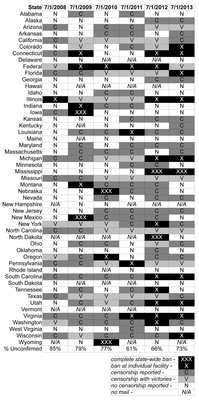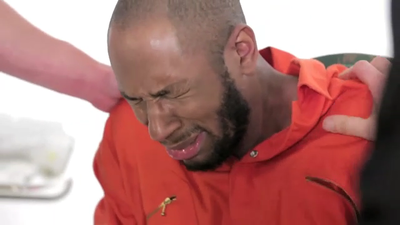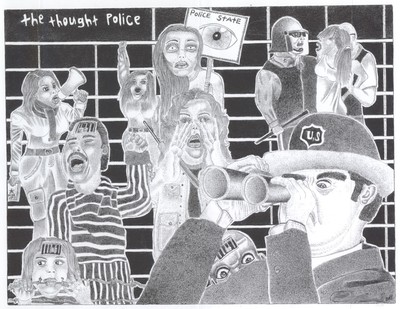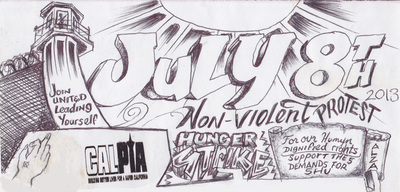MIM(Prisons) recently concluded our annual Congress, where our
membership came together to realign our strategic orientation to
continually improve our productivity and effectiveness supporting the
anti-imperialist struggle behind bars. This report is to give our
readers a better idea of how MIM(Prisons) supports their struggles, and
our plans for the upcoming year.
Correspondence
Although we are not able to respond personally to every letter we
receive, we have a lot of mail going out to prisoners including
bi-monthly ULK, form letters addressing frequently asked
questions, study group and campaign mailings, and books, magazines and
study packs. On average we are sending out at least one piece of mail
for every letter we receive. In addition to our correspondence through
the mail with prisoners, the writings from Under Lock & Key
are on our website
www.prisoncensorship.info.
Traffic to the news on our website has doubled this year!
One way that we track our success in expanding influence inside Amerikan
prisons is by counting subscribers to Under Lock & Key. We
know that most copies are read by many people, but the number of
subscribers is a good indicator of our influence and growth from year to
year. We want to see our subscriber list grow so that we can ensure each
issue reaches as many people as possible. This is a key tactic to spread
revolutionary education and build the anti-imperialist movement.
Since the formation of MIM(Prisons) we have seen a steady increase in
our numbers of ULK subscribers, but this year that trend
reversed. Between our last annual congress in July 2012 and the congress
this year, our readership is down by about 17%. After continuously
increasing our number of subscribers for years, we may have finally hit
a ceiling. In the last year, MIM(Prisons) volunteers have not made any
significant changes to the way we work with prisoners. We write more on
how to overcome this challenge below.
United Struggle from Within
A large part of our discussion at Congress was centered around our
support for the anti-imperialist mass organization for former and
current prisoners, United Struggle from Within (USW). Where MIM(Prisons)
can’t physically do necessary organizing work, USW is our feet on the
ground. This section outlines some of the successes and progress of USW,
as well as deficits where there needs to be improvement.
Compared to our USW membership statistics from Congress 2012, USW
appears to be getting larger and more stable. This is a huge advance.
The struggle to liberate people of the world from capitalism and
imperialism can’t just be taken up when it sounds fun or exciting, or
when you have the spare time. The more comrades inside who understand
this, and make a long-term commitment to doing as much as they can to
liberate the most oppressed people in the world, the better off we will
all be in the long run. We encourage those who have dabbled in USW work
to keep up your commitment, and continually check page 12 of Under
Lock & Key for ways to plug in. If you’ve already gotten ten
people to send out grievance petitions, why not get ten more, or try to
push it to the next level? If you’ve already got a local study group
going, why not send us a report on how you did it so others have a
better idea how to start one up in their conditions? To be considered an
active USW member, you have to have put in some kind of USW-related work
in the last year. This is the most lax yet reasonable requirement
possible, and shouldn’t be difficult for people to adhere to on a
long-term basis as long as they have a genuine interest in ending
oppression for everyone worldwide.
Developing Leadership
USW Leaders are those who are not only participating in the campaigns
organized by others, but come up with ideas for how to push the struggle
forward where they’re at, and organize others to do so. Even one
individual taking on a leadership role increases the anti-imperialist
struggle exponentially in that state or facility. A USW Leader makes
incredibly significant contributions to our overall work, and we provide
as much support for them as we can. The pages of Under Lock &
Key are a good place to look for ideas on what campaigns to push
where you’re at, but a great USW Leader also analyzes their conditions
and shapes campaigns as needed to have the most success among their
organizing base.
Increasing Subscribers
For a couple years we have been tracking how new subscribers are
referred to us. In a change from past years, this year active recruiting
by prisoners has led more people to sign up for Under Lock &
Key than ads or MIM(Prisons) work. Even referrals that came from
MIM(Prisons) work is catalyzed by someone signing up for our newsletter
or engaging with us on some level. Without the efforts of prisoners, we
can’t get literature into a facility.
While the proportion of referrals from prisoners did increase, our
overall level of new subscribers went down. We know that most of our new
subscribers find us through other prisoners, either from a copy of
ULK that you have passed around or from a recommendation you
make personally to them to get in touch with us. This means that you,
our readers and supporters, have a big hand in determining how many
people get to read Under Lock & Key. We call on you to step
up your work in this area. This is an easy but critical way that you can
contribute to building the anti-imperialist movement against the
criminal injustice system. You should pass your copy of ULK
around, leave it in the day room, or put it on the library cart or
wherever you can so that others might pick it up. You can write to us
for extra copies of ULK if you want to distribute them in your
prison. If you send us names of people who tell you they are interested
in a subscription, we will add them to the mailing list. Spread the word
however you can. After all, the six-month subscription is free
to prisoners!
On our end, we have contacted every prisoner resource guide we know of
and asked them to tell their subscribers about the work we do. If you
know a resource guide or newsletter that we are not listed in, please
write to them and ask them to add us! In Pennsylvania a USW comrade gave
our information to the Graterfriends newsletter, and we
received a major spike in new subscribers from that one plug alone. Now
Pennsylvania is getting more access to this important political
perspective.
ULK Sustainers
This year as part of our work with United Struggle from Within we
initiated a ULK Sustainers group. A ULK Sustainer is someone who
recognizes the importance of this newsletter and puts their money where
their mouth is. One copy of Under Lock & Key costs about $1
to print and mail. To cover your issue of ULK you could pledge
to send in $1 per issue. To cover your issue and one other persyn’s, you
would send in $2 per issue. If you want to sign up to be a Sustainer,
just tell us and we’ll send you more info. You can always send us
donations without committing to a pledge, but if you want to send checks
the easiest way is to become a ULK Sustainer.
The past couple months have been spent developing the structure of the
Sustainers arm of USW, and at Congress we were able to establish a
concrete financial goal: More ULK! According to the
Reader
Survey we have been collecting for the past couple issues, there is
a high demand for more Under Lock & Key content. From now
on, whatever financial contributions we receive that aren’t for
something else specific (purchasing literature, study group payment,
etc.) will go into the Sustainers fund. When we have enough money
donated, whether in stamps or checks, we will run 4 extra pages in
Under Lock & Key. It should cost about $250 to reach this
goal, each issue. We will determine the content of these extra pages
based on what people requested in the Reader Surveys, or if you send a
donation you can even help determine the content by telling us what you
want to see more of.
Campaigns
One big campaign USW has been pushing since 2010 is the
Petition for
the Proper Handling of Grievances, which is currently available for
use in eleven states. Comrades in California and Texas have been pushing
this campaign forward into the courts and to those outside the prison
walls. We’ve been reporting on the ongoing successes, challenges, and
tactical approaches of these campaigns in the pages of ULK as
we learn of them. The states currently participating in this campaign
are Arizona, California, Colorado, Florida, Montana, North Carolina,
Nevada, Oklahoma, Oregon, and Texas.
Another campaign that is taking off with renewed energy this summer is
for the end
to long-term isolation. This campaign has been one we’ve focused on
since our founding, and look forward to its development in the coming
months.
Education Behind Bars
An ongoing goal of USW has been to expand prisoner-coordinated study
groups. This year we are aware of more active prisoner-led study groups
behind bars than at this time last Congress. Yet we still don’t have an
idea of how active they are, and our influence on these study groups is
minimal.
MIM(Prisons) can’t provide all the political education that’s needed
through our mail-based study groups, and some people can’t participate
in our study groups due to censorship. Therefore, we are going to be
making a more conscious effort to support prisoner-led study groups by
sending literature, soliciting reports, and engaging in political
dialogue with the groups. If you run or work with a study group inside,
let us know and we can plug you in for free study materials and
political guidance.
USW comrades will still need to take on the task of finding people to
study with and making sure you stay engaged. We recommend you aim to
have weekly study group meetings if possible. Our comrades behind bars
need to take the leadership here, but we can help.(1)
Advances in Available Literature
For the most part, our glossary of compiled political terms is ready for
distribution. Other study packs we have made available in the last year
are study questions for Fundamentals of Political Economy by
Shanghai Press, Fundamental Political Line of MIM(Prisons), and
a study pack made by Rashid of the NABPP-PC, Historical &
Dialectical Materialism.
We are also pleased to announce that the salient chapter of our
forthcoming book on the lumpen class in the United $tates is out in
draft format. It has taken a lot of work and time to get this chapter
together, and we look forward to the feedback we receive. Our goal is to
print the rest of the book next year.
We have also made progress expanding our library and reducing our costs
to reproduce important historical texts for our Free Books to Prisoners
Program.
Spanish Development
In 2010 we set a goal of improving our Spanish language material. Our
translators and Spanish editors are an invaluable part of that goal and
we thank them for every Spanish article in every issue of Under Lock
& Key. Within the year we plan to release the book Chican@
Power and the Struggle for Aztlán, which was primarily authored by
comrades of the United Struggle from Within. This book is written in
English, but has acute relevance for many of our Spanish-speaking
comrades in prison and out. Comrades hope to begin work on a Spanish
translation once it is complete.
Since 2010, we have compiled Spanish literature packs, which include
Que es el MIM? and Teoría del MIM 1: Los Proletarios
Blancos? as well as old copies of the newspaper Notas
Rojas.
Recently, USW comrades translated the entire magazine MIM Theory 10:
Labor Aristocracy into Spanish, and we will soon have it available
on our website for distribution. It is a raw translation, and has not
been edited, but we hope someone who is fluent in Spanish and
revolutionary theory will clean it up.
Prisoners Legal Clinic
The Prisoners Legal Clinic (PLC) is a legal-resource-compiling group
that focuses on legal battles that push forward our overall strategy of
building independent institutions to overthrow imperialism in favor of
the world’s oppressed majority. If you have legal experience and want to
contribute to this aspect of our struggle, write us to plug in.
MIM(Prisons) does not have the legal resources or education to generate
comprehensive legal information, especially compared to the
liberal-“left” organizations such as California Prison Focus or Columbia
Human Rights Law Review. But we do attempt to fill in the gaps where we
think their help guides are potentially lacking. In the last year we
have cleaned up and published online three help guides, which we also
distribute to our subscribers behind bars: “Access to Courts.”
“Isolation in Texas,” and “Grievances and Exhaustion.”
Besides identifying deficits in existing resources, another area the PLC
can grow is where our PLC contributors themselves see areas of the law
to exploit for our own purposes. One contributor, from the American
Prisoners Association (APA), submitted a pamphlet to us titled “You,
Prison Officials, and Contract Law.” In this pamphlet, APA outlines
their theory on how to use contract law to defend the rights of
prisoners, including defending against violations of grievance
procedures. We are distributing this pamphlet as part of our Free Books
for Prisoners Program, and encourage other PLC contributors to look it
over, put it into action if they think it is sound, and tell us how it
worked out.
Moving Forward
In the coming year we will focus on finishing a number of large projects
that have been in the works. As we do so, we ask USW comrades to
continue to expand our work in the ways described above. If we can
achieve both sets of goals that we have laid out, we anticipate great
success in our movement going forward.














